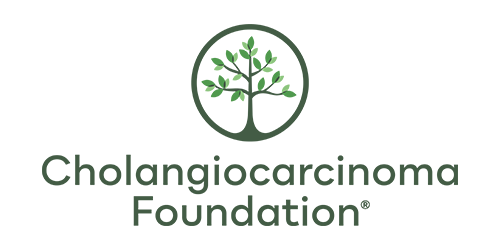Scientific Update: Webinar Recap – Immunotherapy Insights for Cholangiocarcinoma
In a CCF webinar, Dr. Haley Ellis provided an overview of recent advances in immunotherapy for cholangiocarcinoma. These cutting-edge therapies harness the body’s immune system to help eliminate cancer cells. For example, immune checkpoint blockade therapies such as anti-CTLA-4 and anti-PD1/PD-L1 antibodies remove the brakes from the immune system to increase anti-tumor immune response. While an essential treatment option for some patients, only 1-5% of biliary tract tumors harbor relevant biomarkers. Pembrolizumab is also approved for tumors with high tumor mutation burden, although there is significant overlap with the microsatellite instability-high and mismatch repair-deficient group.
Since single immunotherapy agents have a limited role in treatment, recent trials have explored combining immunotherapy and chemotherapy. The TOPAZ-1 trial combined the anti-PD-L1 antibody Durvalumab with gemcitabine/cisplatin and established a new first-line standard of care for advanced cholangiocarcinoma in 2022. The recent KEUNOTE-966 trial tested gemcitabine/cisplatin plus Pembrolizumab for advanced cholangiocarcinoma and found a modest improvement similar to the TOPAZ-1 study. These immunotherapy and chemotherapy combinations are also being explored as treatment options for earlier-stage tumors eligible for surgical resection.
Additionally, preclinical studies are beginning to combine targeted therapies with immunotherapies. IDH1-mutated tumors often have an immunosuppressed tumor microenvironment with few T cells, and a recent lab-based study found that combining the IDH1-targeted therapy ivosidenib (Tibsovo) with CTLA-4 checkpoint blockade led to tumor shrinkage. A clinical trial recently began based on these results. Phase II studies also explore Lenvatinib (an anti-angiogenic multi-kinase inhibitor) combined with Pembrolizumab and have found promising results. Anti-CD40 antibodies and radiation are also being evaluated as ways to enhance immunotherapy response. Many additional combination approaches are also being evaluated in studies, so further advances in immunotherapy for cholangiocarcinoma are likely in the coming years.
